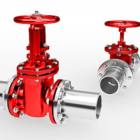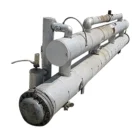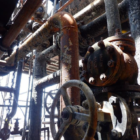TechCorr, a leading provider of NDT and asset management solutions, recently undertook a comprehensive inspection of a Nafta pipeline system that had been exposed to a severe fire incident. The inspection focused on a Class 2 carbon steel (CS) piping system, designated as SK-019, which was operational in a refinery setting.
The Challenge: Due to the fire, this system had been subjected to extremely high temperatures, raising concerns about potential issues with its structural integrity, such as corrosion, coating breakdown, and mechanical damage. TechCorr’s primary objectives were to evaluate the extent of damage, determine the system’s suitability for continued operation, and recommend necessary repairs.
Employing a multifaceted approach, TechCorr’s experts utilized a range of advanced NDT techniques to accurately assess the pipeline system’s condition. One of the primary methods employed was Ultrasonic Thickness (UT) measurement, which enabled the systematic measurement and documentation of wall thickness values. By establishing Condition Monitoring Locations (CMLs), TechCorr’s team revealed a 22% wall loss relative to the nominal thickness and identified areas vulnerable to further deterioration.
In addition to UT measurements, TechCorr’s knowledgeable team conducted a comprehensive visual assessment to identify any surface imperfections, such as mechanical deformation, general corrosion, and coating failure. A metallographic study was also performed to investigate potential microstructural changes due to the fire exposure. Notably, no significant alterations or microstructural damage were found, indicating that the material’s primary properties were preserved.
TechCorr’s experts also conducted hardness testing on the suction and discharge sections of the pumps, verifying that there was no heat-induced brittleness or softening, and that the material’s hardness remained within acceptable limits. The inspection revealed overall corrosion and coating degradation due to the intense heat from the fire, with observations including numerous rust patches, corroded flange studs and bolts, and peeling and burned coatings. Despite these issues, the engineers found no significant leaks or misalignments, and the system’s structural integrity was largely maintained.
Based on these findings, TechCorr’s professionals recommended applying NACE SSPC-SP-3 standards for complete cleaning and recoating of corroded areas. This preventive action is crucial to extend the life of the affected components and prevent unplanned leaks. Additionally, it was advised to perform thorough maintenance and leak testing on all valves prior to restarting operations. Due to the visible scale corrosion on the flanges and gaskets, gasket replacement was also recommended. Furthermore, the fire damage to the platform near Drum D-1 necessitated the construction of supports, and strengthening this structure was crucial for ensuring safe access and operation.
TechCorr’s meticulous application of advanced NDT techniques underscores the importance of comprehensive inspections in asset integrity management. The company’s qualified team conducted metallographic analyses, hardness tests, and UT measurements to provide a thorough evaluation that guided targeted maintenance plans. This proactive approach not only ensures the continued safety and reliability of the Nafta piping system but also highlights TechCorr’s commitment to excellence in asset management and non-destructive testing. By leveraging its expertise and cutting-edge methodologies, TechCorr continues to set industry standards, ensuring that critical infrastructure remains secure, efficient, and operational.





